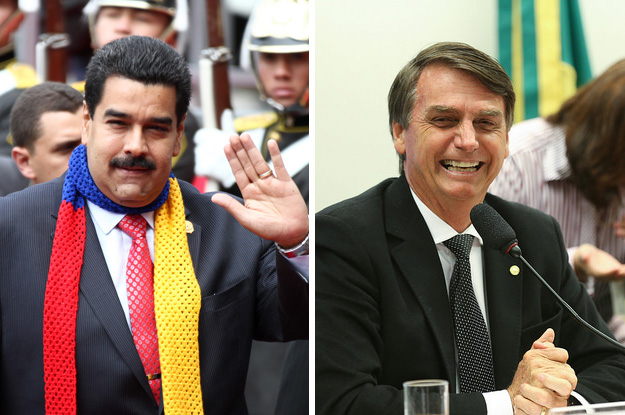At least one group is giving Donald Trump’s presidency rave reviews so far: Latin American populists.
Whether they see shadows of their own nationalist views in Trump’s “America First” agenda, or merely sense an opportunity for improved diplomatic ties with Washington, high-profile populist figures on both the left and right have taken to Twitter and other media to express their support.
In Argentina, Trump fever has been especially high among politicians close to former President Cristina Fernández de Kirchner, who from 2007 to 2015 slapped high tariffs on imports, manipulated economic data and vilified the country’s traditional economic and political elite.
Trump “is doing everything we did,” Fernández’s former trade secretary, Guillermo Moreno, said in an interview with MDZ radio. Moreno even said he believes Trump “is a Peronist” – a reference to the nationalist, union-dominated movement that has dominated Argentine politics since the 1940s.
Daniel Scioli, who narrowly lost a bid to succeed Fernández as president in 2015, likewise commended Trump’s emphasis on national industry in a Facebook post, echoing the new president’s #AmericaFirst hashtag with his own #PrimeroArgentina.
Venezuelan President Nicolás Maduro, currently besieged by a catastrophic recession and shortages of food, medical supplies and other basic goods, told reporters the new occupant of the White House had been a victim of a “brutal hate campaign” by the media.
“He won’t be worse than Obama,” Maduro added.
These sympathetic views appear to be a minority among Latin American leaders – at least so far. The region is dominated by presidents such as Peru’s Pedro Pablo Kuczynski, Argentina’s Mauricio Macri and Chile’s Michelle Bachelet, all of whom are committed to trade and the prevailing globalism of recent years. Latin America’s own bouts with populist protectionism in the 2000s in Brazil and Argentina, for example, ended in recession.
Some analysts also question how sincere some of the support for Trump is – especially from the ideological left. With such statements, Maduro may be motivated less by common cause and more by a desire to seek better diplomatic ties at a time of national crisis, according to Venezuelan political analyst and consultant John Magdaleno.
“Given what Trump has said and his choices for cabinet members, Maduro can presume that Trump won’t be as diplomatic as Obama and that there may be the possibility of an economic or more severe diplomatic intervention. So he’s just trying to open a space for dialogue in this moment of vulnerability,” Magdaleno told AQ.
Similar thinking may have motivated Bolivian President Evo Morales, who on inauguration day tweeted his hopes that his country could restore diplomatic relations with the U.S. by exchanging ambassadors, which they haven’t had since 2008. “We hope that with the new president of the U.S., interventions and military bases in the world end,” Morales wrote in another tweet.
One figure whose affinity for Trump is based more on shared values is Brazil’s Jair Bolsonaro, a right-wing former army officer who has placed as high as fourth in nationwide polls for the 2018 presidential race. He has been the leading candidate among wealthy Brazilians, and tapped into a nationwide anger with the political establishment amid unprecedented recession and corruption scandals.
Bolsonaro posted a video congratulating Trump on his inauguration. He had hoped to travel to Washington to attend, but said in an interview that aired the next day that it wasn’t possible. “I always rooted for Trump … I think (his victory) can help us,” he said.
Like Trump, Bolsonaro has publicly voiced support for torture and blamed the media for distorting his views.
“At the end of the day, Trump stood up to the politically correct, stood up to the polling firms, stood up to the big rotten media,” Bolsonaro said admiringly in the interview.
It’s not just national politicians climbing on board. Two city council members from southern Brazil signed a letter to Trump asking to attend the inauguration, and congratulating him for winning with an agenda that “criticized the invasion of immigrants.”
Some analysts have expressed alarm over the rising Trump-ism. Prominent Brazilian economist Ricardo Amorim wrote on Facebook on Jan. 22 that Trump’s economic agenda was starkly similar to that of former President Dilma Rousseff, a leftist leader whom most blamed for leading Brazil into its recession before she was impeached in 2016.
“Protectionism to defend the interests of the country and our jobs. Exponential increase of public deficit through government spending and tax cuts. A worse than distorted relationship between the government and the private sector … Dilma called it a ‘new economic matrix’ and Trump calls it ‘make America great again,” Amorim wrote.
Unlike many other populists in the region, Mexico’s Andrés Manuel Lopez Obrador has not welcomed the Trump presidency – but he may stand to benefit from it.
The former mayor of Mexico City, who is gearing up for a third presidential run, has presented himself as someone who will stand up against Trump – and in favor of Mexico’s interests. He saw his popularity spike after Trump’s victory in November. A poll from Mexican newspaper El Financiero found that López Obrador was believed by Mexicans to be the most apt to take on the likely challenges of a Trump presidency.
Indeed, while recent election results in Argentina, Bolivia, and Peru indicate that Latin America’s populist wave is in decline, many leaders believe they stand to see their political fortunes rise as a result of Trump’s victory.
As Argentina’s Moreno remarked: “Now, when we return, we won’t have the world against us.”
—
O’Boyle is an editor for AQ
Krygier is an editorial intern for AQ






